Make It Do – Metal Shortages in World War II
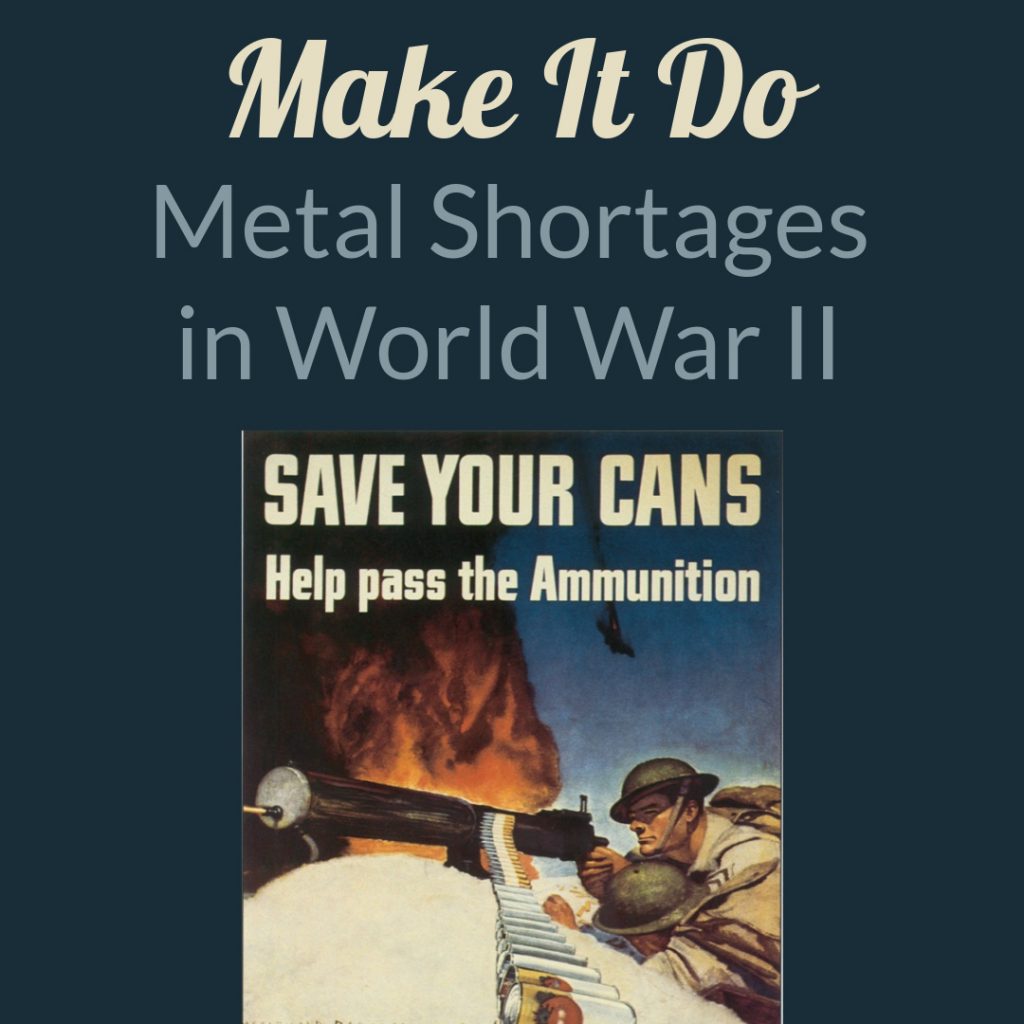
Imagine going to the store and not finding batteries, thumbtacks, alarm clocks, or paper clips on the shelves.
During World War II, metals were needed for military purposes. Ships and planes and jeeps and guns and ration tins and helmets took precedence over civilian products. After the United States entered the war, factories quickly shifted from manufacturing civilian goods to military matériel.
Preparation for War
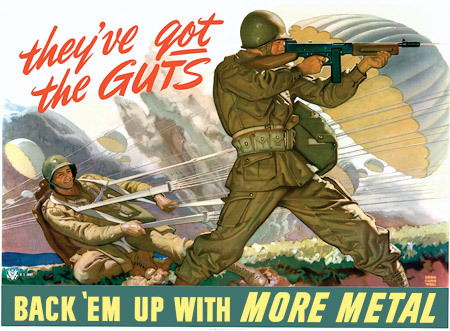
US poster encouraging conservation of metal for military purposes, WWII
In 1941, the United States was still neutral. However, military production grew to increase America’s readiness and to send war materiél to the Allies under the Lend-Lease Act (signed March 11, 1941). On March 21, 1941, the Office of Production Management limited use of aluminum, and on August 2, 1941, it restricted steel to government use only.
After the US entered the war on December 8, 1941, US industry quickly converted to war production.
Restrictions
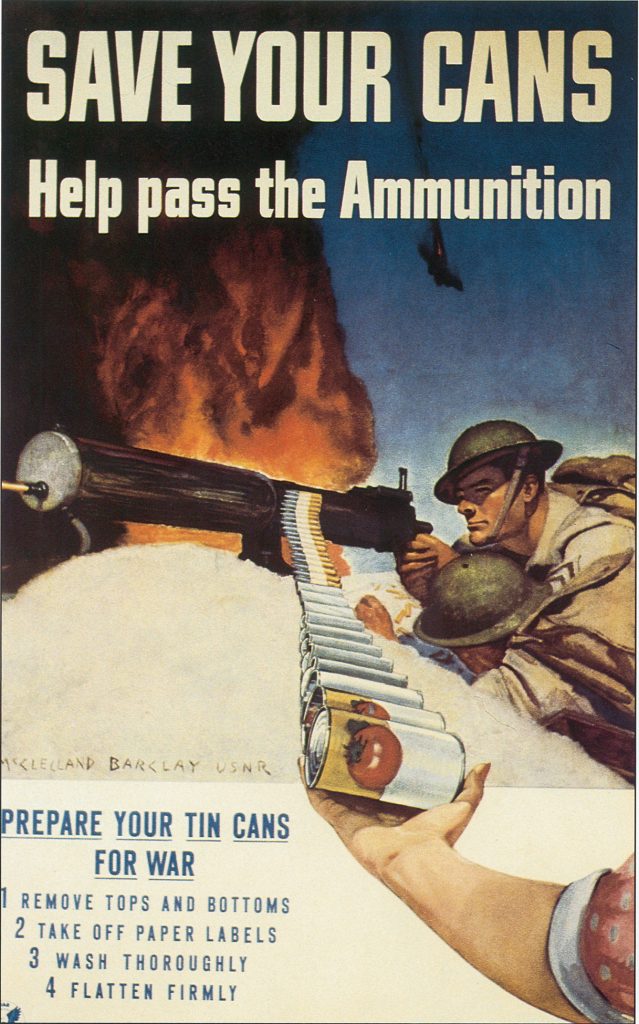
US poster encouraging tin can collection, WWII
Civilian vehicle factories were the first to be converted to military use, and the last automobile rolled off the assembly line on February 10, 1942.
On April 2, 1942, the US War Production Board (WPB) ordered a reduction in the use of tin in packaging of civilian products. Anyone who wanted to purchase a tin tube of toothpaste, shaving cream, or medicated ointment had to turn in the old tube first.
One month later, on May 5, 1942, the use of steel & iron was banned in more than four hundred civilian products, and production of civilian appliances was discontinued.
On March 1, 1943, restrictions on the use of tin resulted in the rationing of canned foods (Make It Do—Rationing of Canned Goods in World War II).
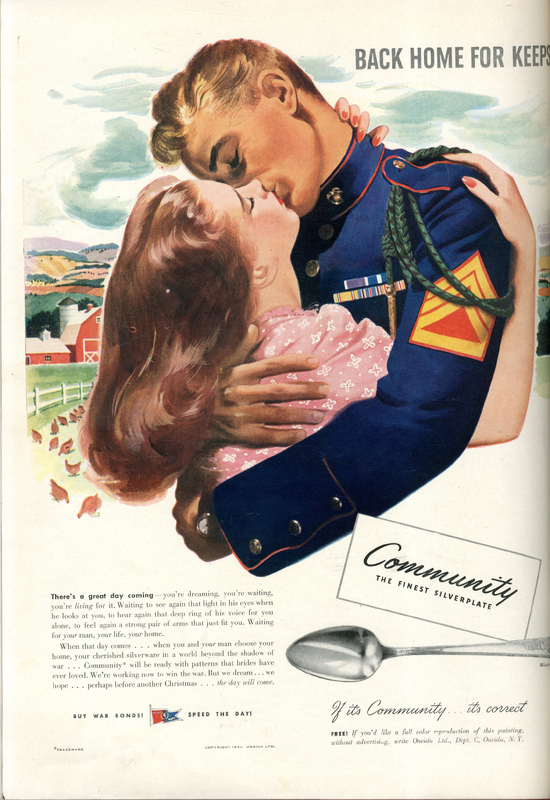
Oneida Silverware “Back Home for Keeps” advertisement looking forward to peacetime when its production will again be available to young couples, 13 Dec 1943 (Western Connecticut State University Archives)
Manufacture of silverware was discontinued March 31, 1943. Oneida converted to making flatware for military, bayonets, surgical instruments—and promoted their conversion in a wildly popular “Back Home for Keeps” advertising campaign.
Even coins were affected. From October 1942, the US Mint removed all nickel from nickels, using a copper-silver-manganese alloy for the duration. And on January 27, 1943, steel pennies replaced copper, leading to confusion between pennies and dimes. On January 1, 1944, copper returned to pennies, salvaged from spent shell casings.
Shortages
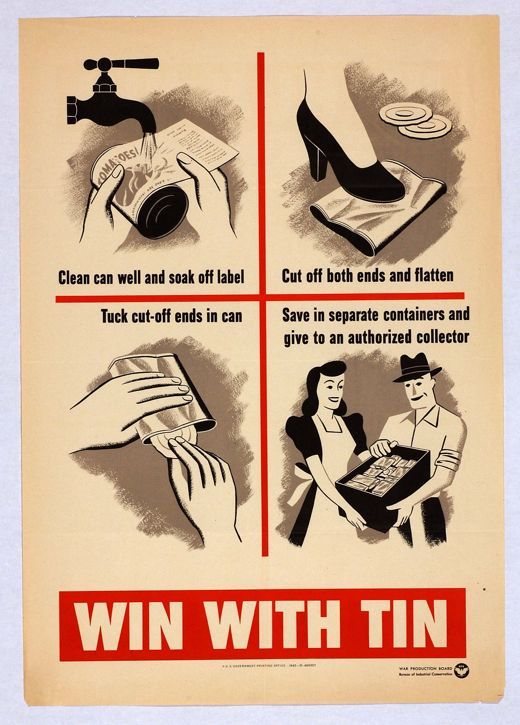
US poster with instructions for tin can collection, 1943
Scrap drives and tin can drives reclaimed tons of metals, but not enough to prevent shortages. (See: Make It Do—Scrap Drives in World War II)
Many everyday items became hard to find—can openers, kitchen utensils, steel wool, batteries, pie tins, hair curlers, razor blades, wristwatches, thumbtacks, paper clips, pins, needles, zippers, garden tools, and bed springs. When ladies went to the beauty salon, they were even required to bring their own bobby pins due to the shortage. People learned to take care of what they had—or do without.
Appliances
Both large and small appliances were not manufactured during the war, so appliance stores shifted their business focus from sales to repairs. Often families or neighbors would share appliances. In July 1944, to encourage home canning but prevent botulism, 400,000 pressure cookers were released for sale, preferably for community use. In Antioch, California, the PTA purchased a pressure cooker to share within the community.
Toys

US poster promoting war bond sales, 1942
Many popular children’s toys couldn’t be manufactured due to restrictions or shortages of rubber, tin, and steel. Manufacturers converted to wood and cardboard. (Learn more about toys in WWII here: A WWII Christmas—Teaching About Christmas Past to Reduce Christmas “Presents”)
Typewriters
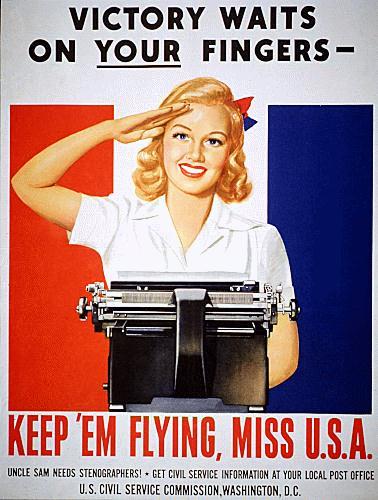
US poster, WWII
Not only did typewriters contain metal, but they were vital to a paperwork-dependent military. In July 1942, a call went out to the public to donate late-model, nonessential typewriters to the military. Typewriters were rationed in the US from March 6, 1942 to April 22, 1944, requiring a certificate from the local ration board for a purchase.
Plaster Statues
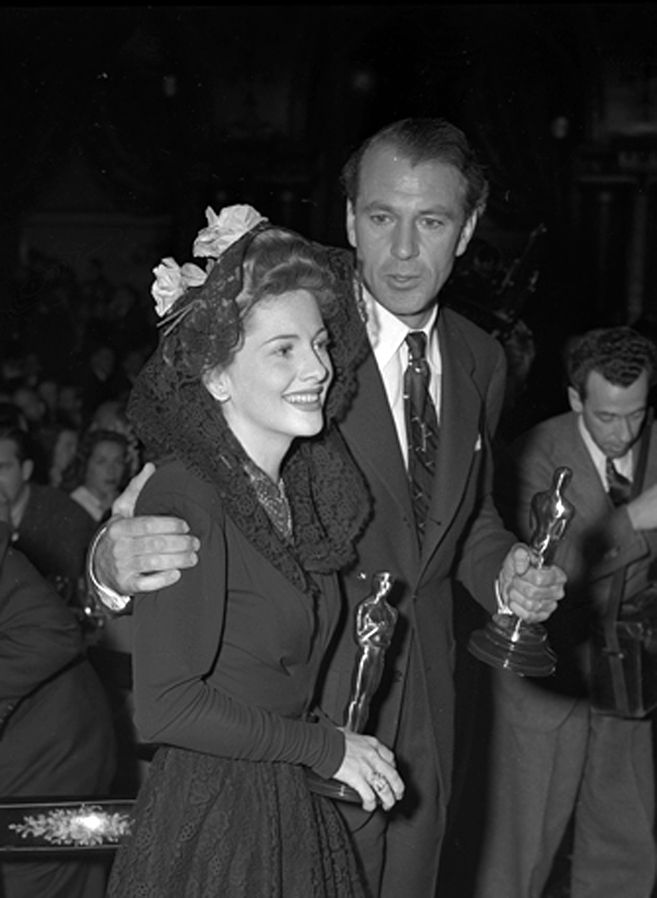
Joan Fontaine and Gary Cooper holding their (plaster) Oscars at the Academy Awards after party, Feb. 26, 1942 (public domain via Los Angeles Times photographic archive, UCLA Library)
Beginning with the 1942 Academy Awards, the Oscar statuette was made of plaster sprayed with bronze lacquer for the duration. Recipients could exchange them for the traditional gold-plated bronze after the war.
Likewise, when President Franklin D. Roosevelt dedicated the Jefferson Memorial on April 13, 1943, the 200th anniversary of Jefferson’s birth, Jefferson’s statue was made of plaster painted bronze, It was replaced in 1947.
Failures
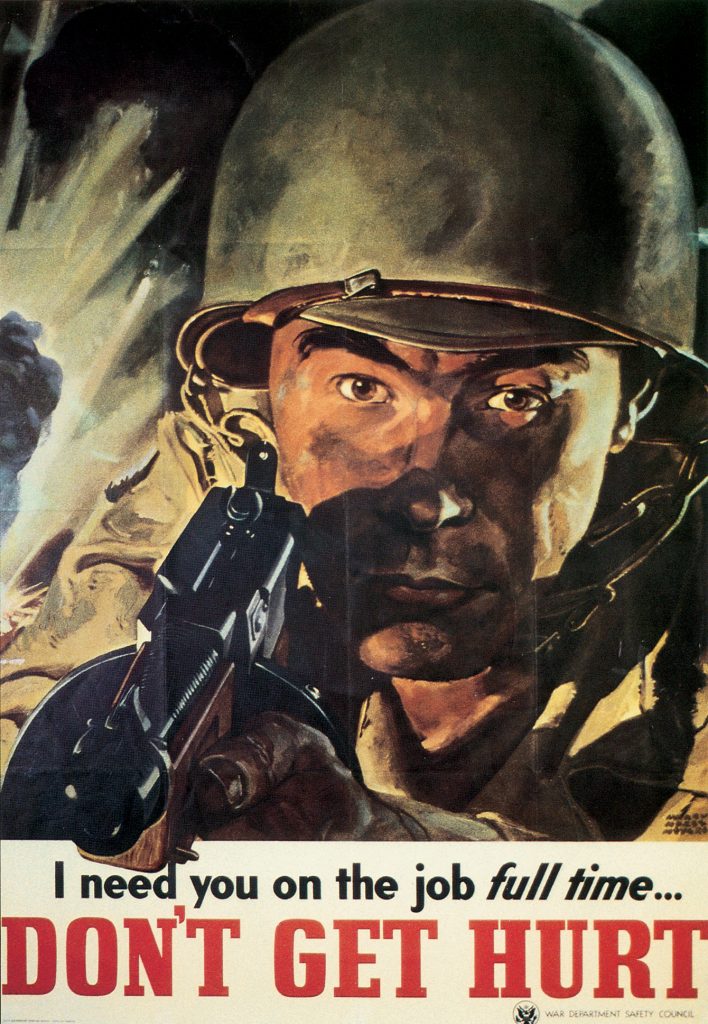
US poster, 1943
Some programs ended up as humorous failures. In July 1942, the US government proclaimed a stop to the manufacture of beauty products metal packaging—but a great uproar led to the repeal four months later. Manufacturers used more glass jars in packaging.
Sliced bread also briefly became unavailable. On January 18, 1943, the sale of sliced bread was banned in America to conserve the metal blades. This ban lasted only until March 8.
Alarm clock production stopped in the US on July 1, 1942. However, employers all over the nation lobbied to resume production to reduce absenteeism. In March 1943, alarm clocks were produced again.
Relaxed Restrictions
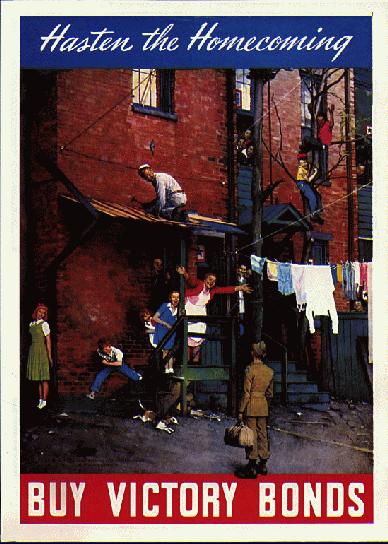
US Victory Loan Drive poster by Norman Rockwell, 1945
As the tide of war swung to the Allies, US leaders began to plan for postwar conversion. On October 29, 1943, the ban on using aluminum was relaxed. And on June 18, 1944—after D-day—industry was allowed to produce civilian items under spot authorization.
After the Battle of the Bulge prolonged the war, production of civilian goods was again halted on January 1, 1945.
However, victory led to an end of restrictions. On August 18, 1945, President Harry Truman restored the free market, and on August 20, the War Production Board lifted controls on consumer items. On August 30, the first automobile rolled off the assembly line—a Hudson Super Six coupe.
Which of these shortages would have been most difficult for you?


[…] In US, tin tubes for toothpaste & shaving cream must be turned in to buy new tube; restrictions placed on use of tin in consumer packaging. (See: Make It Do – Metal Shortages in World War II) […]
I was a toddler in’42. Now I see why all I got for Christmas was paper dolls, color books and oranges. We never had toothpaste in tubes. Salt was used to brush our teeth.
Before reading your books, I did not imagine the extent of the rationing that took place during World War II. We do not realize how blessed we are!